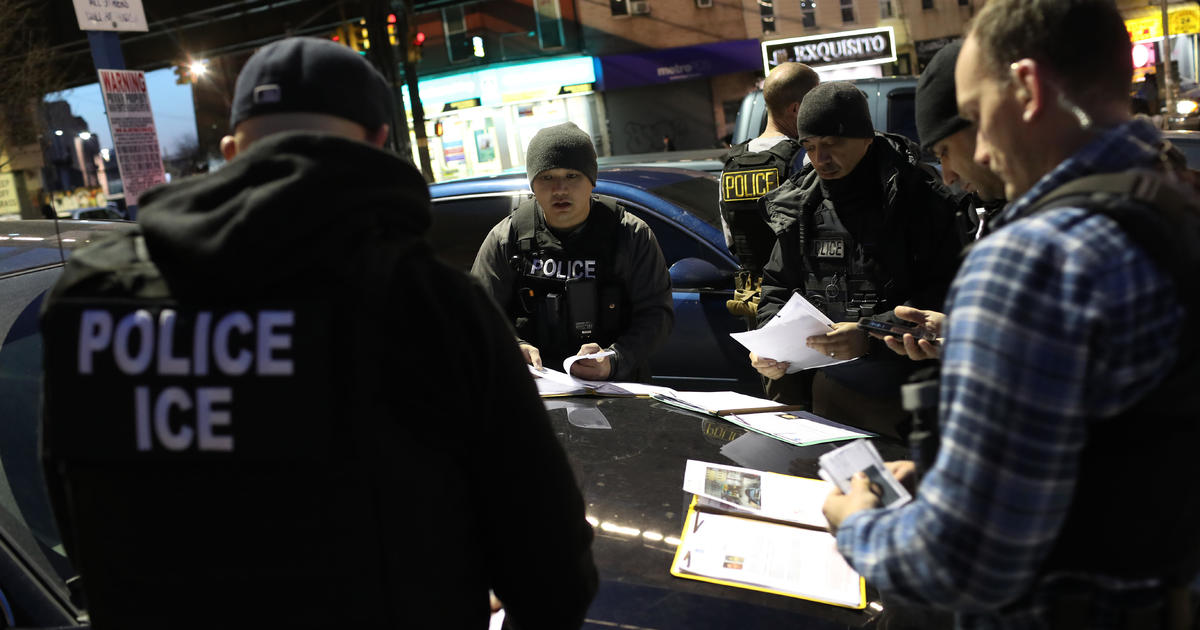
U.S. Immigration and Customs Enforcement (ICE) in 2020 arrested and deported fewer immigrants than in any year during President Trump’s tenure, and the number of deportations hit a 15-year low, largely as a result of the coronavirus pandemic, according to agency data released Wednesday.
In fiscal year 2020, ICE said it carried out more than 185,000 deportations, significantly fewer than the 226,000 deported in 2017, the previous low for the Trump administration. The last time ICE deportations were lower was in 2005, when 180,000 deportations were carried out, according to figures provided by the agency.
ICE also conducted 103,000 immigration arrests this past fiscal year, including nearly 24,000 during “at large” operations, which take place in communities, as opposed to transfers from local law enforcement. In fiscal year 2019, the agency arrested 143,000 immigrants, including 35,000 during at-large sweeps.
The numbers published on Wednesday show that more than 935,000 immigrants were deported during the four fiscal years of the Trump administration, which lifted Obama-era limits on who ICE could arrest and deport. During the first four years of President Obama’s tenure, ICE reported more than 1.5 million deportations — including 409,000 in 2012, a record high.
The number of immigrants currently being held at the agency’s network of for-profit detention facilities and county jails — which form the largest immigration detention system in the world — has also plummeted during the pandemic, decreasing from more than 37,000 in mid-March to 16,000 as of earlier this month.
The low number of detainees, ICE said, is directly linked to an emergency policy instituted in March that U.S. border officials have been using to rapidly expel most migrants and asylum-seekers to Mexico or their home countries.
ICE said arrests and deportations dropped sharply in 2020 because of air travel restrictions and coronavirus mitigation policies. The agency also limited arrests in the spring, when it announced it would focus on apprehending immigrants with criminal convictions who pose “public safety risks” during the pandemic.
“We did scale down enforcement. We didn’t stop it. We just prioritized those with a criminal element and those subject to mandatory detention that were potentially at large,” Henry Lucero, a top ICE official in charge of arrests, detention and deportations, said during a call Wednesday.
According to agency data, after making more than 11,000 monthly arrests for most of 2019, arrests dropped below 5,000 in April, May and July of this year.
“Around September, we slightly adjusted that,” Lucero added, referring to the scaled-back operations. “We opened the aperture and arrested individuals that were, you know, in the country illegally and that continues today.”
Lucero said his agents are trying to curb the spread of the coronavirus by testing immigrants after arresting them and before transferring or deporting them. The agency has reported more than 8,000 COVID-19 cases and eight virus-linked deaths among detained immigrants throughout the pandemic.
ICE detention is legally a civil matter, designed to ensure that people the government seeks to deport complete their immigration proceedings. Those arrested by the agency — which include green card holders who served time in prison for certain convictions, asylum-seekers and undocumented immigrants — are held solely on immigration violations, not on criminal grounds.
Soon after Mr. Trump took office, ICE rescinded Obama-era memos that instructed agents to focus on arresting immigrants with criminal convictions, migrants apprehended along the U.S.-Mexico border and those who entered the country without legal permission more than once.
According to ICE, 86% of those arrested in fiscal year 2020 had criminal convictions or pending charges.
About 123,000 of the migrants deported by ICE this past year were apprehended by U.S. border officials, while the remaining, nearly 63,000, were removed from the interior of the country. Those deported included nearly 15,000 members of migrant families — a threefold increase from fiscal year 2019.
President-elect Joe Biden has pledged to impose a 100-day freeze on ICE deportations and expand alternatives to holding immigrants in detention, like case management programs designed to ensure they attend court hearings. Mr. Biden’s advisers reiterated Tuesday that he remains committed to these promises and said the incoming administration will have a “sensible approach” to ICE arrests.
Advocates for immigrants said the relatively low current ICE detainee population and pandemic-related limits on arrests can provide the incoming Biden administration an opportunity to discontinue civil immigration detention.
“There’s absolutely no evidence that, as even as fewer and fewer people are sent to ICE detention, that any communities have been made less safe as a result,” Aaron Reichlin-Melnick, a policy counsel at the American Immigration Council, told CBS News. “This is, in many ways, an ongoing experiment to prove that we do not need to be addicted to immigration detention as a nation, that we can find a better way forward.”

